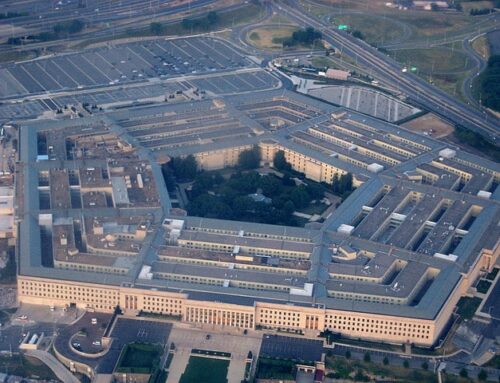Taxpayers for Common Sense and the Project on Government Oversight sent the following letter to each member of the House of Representatives on May 6th.
Click [HERE] to view the letter in PDF format.
Open Letter to the House of Representatives on the National Defense Authorization Act for Fiscal Year 2016
As you consider the National Defense Authorization Act for Fiscal Year 2016 (H.R. 1735), we urge you to carefully consider how the limited taxpayer resources can be best allocated to protect our national security.
Provisions we support:
Compliance with Inventory of Contracts for Services (Section 807). The Department of Defense spends more on services than it does on goods, but has failed for years to meet its statutory requirement to implement an effective inventory of contracts for services and establish the Total Force Management Support Office, which will improve decision-making and result in cost savings. We strongly support the provision enforcing this requirement.
Enhanced Protections for Military Whistleblowers (Sections 535, 544, and 549). We strongly support provisions to provide military whistleblowers fair burdens of proof to establish retaliation, special victims counsels for those who are retaliated against, and requirements for the Department to develop a strategy to prevent retaliation.
Cost-Efficient Workforce Management (Sections 321, 863, and 907). The pressure to reduce the size of government has led to the award of service contracts, resulting in an expanding “shadow government” that costs hundreds of billions of dollars annually. We support preserving the cap on contracting services until civilian personnel ceilings are lifted and the Department of Defense can conduct accurate cost assessments to determine the right workforce mix of military, civilian, and contractor employees. We also support requiring DoD to conduct that analysis before assigning new requirements.
We also oppose several provisions in the bill.
Misuse of the Overseas Contingency Operations Fund. We are strongly opposed to the attempt to circumvent the statutory budget caps by adding $39 billion to the Overseas Contingency Operations (OCO) account. We have consistently opposed Congress and the Pentagon using the OCO account as a slush fund for programs that should be funded through the base budget; it is particularly irresponsible to pay for the daily operations of our military through this slush fund; daily operations are fully foreseeable and require the oversight and accountability that funding through the base budget’s operations and maintenance (O&M) accounts allows. Congress should stop overfunding the OCO beyond the President’s already robust request of $50.9 billion.
Addition of Weapon Systems Taxpayers Can’t Afford. The use of budget gimmicks with OCO has allowed the House Armed Services Committee to pretend to have the funds to support $2.7 billion-worth of “unfunded priorities.”[1] We are particularly disturbed by the addition of six F-35B Joint Strike Fighters for $1 billion. The GAO, Director of Operational Test and Evaluation (DOT&E), and DoD IG have all found significant challenges that call into question the ability of the Marine Corps to meet the initial operational capability (IOC) deadline.[2] The President’s budget request for accelerated production already put taxpayer dollars at undue risk; the inclusion of additional jets is both unaffordable and irresponsible.
Wasteful MOX Fuel Spending (Section 3116). The Mixed Oxide Fuel Fabrication Facility (MOX) was designed to convert weapons-grade plutonium into mixed oxide fuel for U.S. commercial nuclear reactors. The facility is over budget, behind schedule, and lacking even a single customer. We urge Congress to strike the $345 million authorized for this project.
Exacerbating Wasteful Commercial Item Spending (Sections 804, 805, and 852). Using recent prices paid by the government in the determination of price reasonableness will harm the government and severely limit the government’s ability to access any cost or pricing information from contractors selling commercial goods or services. Historic pricing data is insufficient to determine fair and reasonable prices and will result in new bad deals being made based on old bad deals. Moreover, we are concerned that these provisions, which alter the process for determining commercial items, will only exacerbate overpayment problems identified by the GAO and DoD IG. DoD could be locked in to all previous commercial item designations, no matter if the item is still sold on the commercial market or not.
Undermining Testing and Responsible Acquisition Strategy (Sections 851 and 862). We are opposed to adding cost and schedule considerations to the DOT&E‘s operations, which will undermine the office's effectiveness and increase the risk of cost overruns, performance shortfalls, and schedule delays in weapon systems.[3] We also oppose the reduction of authority of the Deputy Assistant Secretary of Defense for Developmental Test and Evaluation and the Deputy Assistant Secretary of Defense for Systems Engineering. Numerous studies, and the findings included in the legislation, show that sound and robust systems engineering and developmental testing are key components to the success of major defense acquisition programs. Moreover, these offices provide reports that play an important role in effective congressional oversight and public scrutiny of weapons programs.
Undisciplined National Sea-Based Deterrence Fund (Section 1407). Rather than exercising discipline over the Ohio Class Replacement (SSBN(X)) program, the Navy has argued that it should be treated as a “national strategic asset” and be separated from the shipbuilding budget. Allowing the Navy to move funding for this program out of its budget reduces discipline in the program and increases the likelihood of gross cost overruns in what the CBO expects to be a $102 billion to $107 billion program. Moreover, it creates a dangerous precedent for the military services to treat other expensive programs, like long range bombers and aircraft carriers, as national assets that shouldn’t come out of their budgets.[4]
East Coast Missile Defense Not Needed and Not Requested (Section 1673). We oppose the addition of $30 million for the planning and design of an East Coast Missile Defense site. Administration and Pentagon officials have rejected the need for an East Coast missile defense site over and over again. Two years ago, the head of the Missile Defense Agency confirmed that there was “no validated military requirement to deploy an East Coast missile-defense site.”[5] Last year, the Office of Management and Budget called the authorization for an East Coast site “premature and potentially wasteful.”[6]
We hope you will consider these concerns as you debate the NDAA. Heeding them will help enhance fiscal responsibility, improve defense acquisition, and strengthen accountability in the Pentagon’s budget.
Sincerely,
Danielle Brian Ryan Alexander
Executive Director President
Project On Government Oversight Taxpayers for Common Sense
[1] Taxpayers for Common Sense, “TCS analysis of National Defense Authorization bill for Fiscal Year 2016,” April 28, 2015. http://www.taxpayer.net/library/article/tcs-analysis-of-national-defense-authorization-bill-for-fiscal-year-2016
[2] “GAO Confirms Increased F-35 Production Is a Terrible Idea,” April 17, 2015. http://www.pogo.org/blog/2015/04/gao-confirms-increased-f-35.html; Project On Government Oversight, “Not Ready for Prime Time,” March 12, 2015. http://www.pogo.org/our-work/straus-military-reform-project/weapons/2015/not-ready-for-prime-time.html; Brian Everstine, “IG Faults management of F-35 engine program,” Air Force Times, April 28, 2015. http://www.airforcetimes.com/story/military/2015/04/28/dod-ig-review-f35-engine-program/26461887/
[3] Project On Government Oversight, “POGO Calls on Senate to Keep Pentagon Testing Office Strong in NDAA,” May 16, 2014. http://www.pogo.org/our-work/letters/2014/pogo-calls-on-senate-to-keep-pentagon-testing-office-strong.html
[4] Taxpayers for Common Sense, “The Navy’s Budget Sleight of Hand,” April 28, 2015. /wp-content/uploads/ported/articles/TCS_Design_R4-web.jpg?v=1429731364
[5] Anthony Capaccio, “Pentagon, Army Say East Coast Missile Defense Site Not Needed,” Bloomberg, June 11, 2013. http://www.bloomberg.com/news/articles/2013-06-11/pentagon-army-say-east-coast-missile-defense-site-not-needed.
[6] Office of Management and Budget, “Statement of Administrative Policy, H.R. 4435 – Howard P. ‘Buck’ McKeon National Defense Authorization Act for FY 2015,” May 19, 2014. https://www.whitehouse.gov/sites/default/files/omb/legislative/sap/113/saphr4435r_20140519.pdf











Get Social